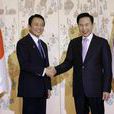溯源
希臘與前南斯拉夫馬其頓共和國之間國名之爭的由來:
在聯合國系統的檔案、會議或其他場合中時常會提及“前南斯拉夫馬其頓共和國”這個名稱,而且在任何正式情況下不能省略“前南斯拉夫”這個前綴,但來自這個國家的外交官卻常常將其祖國稱為“馬其頓共和國”,就連第62屆聯大主席克里姆也這樣自稱,以致引起了希臘的抗議。
另一解釋
In diplomacy and international relations, shuttle diplomacy is the use of a third party to serve as an intermediary or mediator between two parties who do not talk directly. The third party travels ("shuttles") between the two primary parties. Shuttle diplomacy is often used when the two primary parties do not formally recognize each other but still want to negotiate.
在外交和國際關係中,“穿梭外交”用來指某一第三方,在並不直接對話的兩方之間作為中間人負責調停。第三方在這兩者之間代為往來,主要適用於當事雙方互不承認但仍希望進行談判的情況。
The term "shuttle diplomacy" became widespread following Henry Kissinger's term as United States Secretary of State. Kissinger participated in shuttle diplomacy in the Middle East and in the People's Republic of China.
這一術語在亨利·基辛格任美國國務卿時被廣泛使用,形容他在中國以及中東地區的外交經歷。
In a major outbreak of Israel-Hezbollah fighting in 1996, U.S. Secretary of State Warren Christopher conducted shuttle diplomacy, traveling to, among other places, Syria. Having persuaded the Syrians to rein in Hezbollah, Christopher achieved a cease-fire.
1996年以色列和黎巴嫩爆發衝突,時任美國國務卿沃倫·克里斯托弗在多地間輾轉往來,成功說服敘利亞制衡黎巴嫩真主黨行動,最終兩國停火。
In 2008 shuttle diplomacy has been practised by Matthew Nimetz between Greece and the Republic of Macedonia to resolve the Macedonian naming dispute
2008年現任美國大西洋大眾投資公司諮詢師馬修·尼米茲在希臘和馬其頓共和國之間來回奔走,解決改名糾紛。這一事件也是“穿梭外交”。

